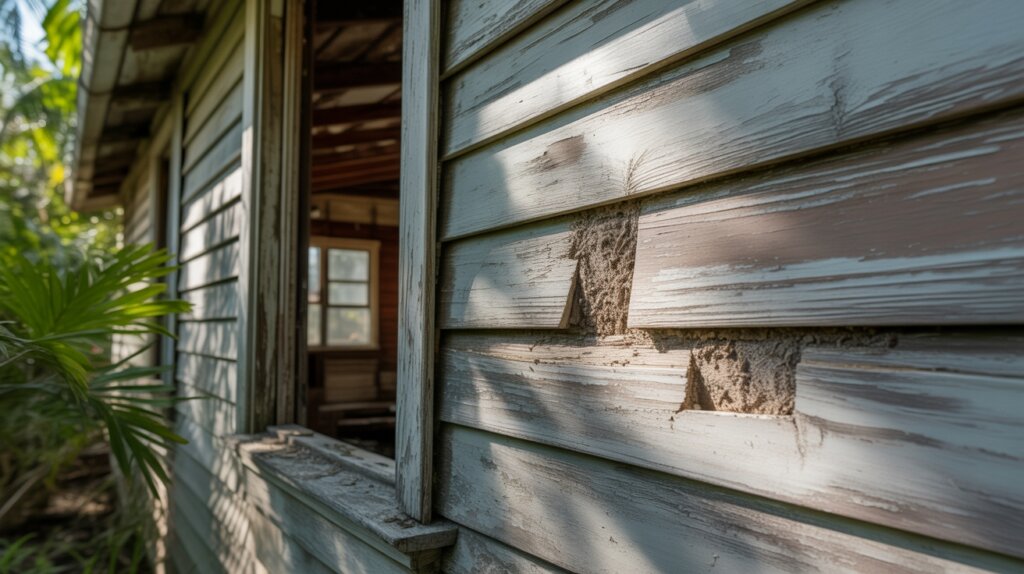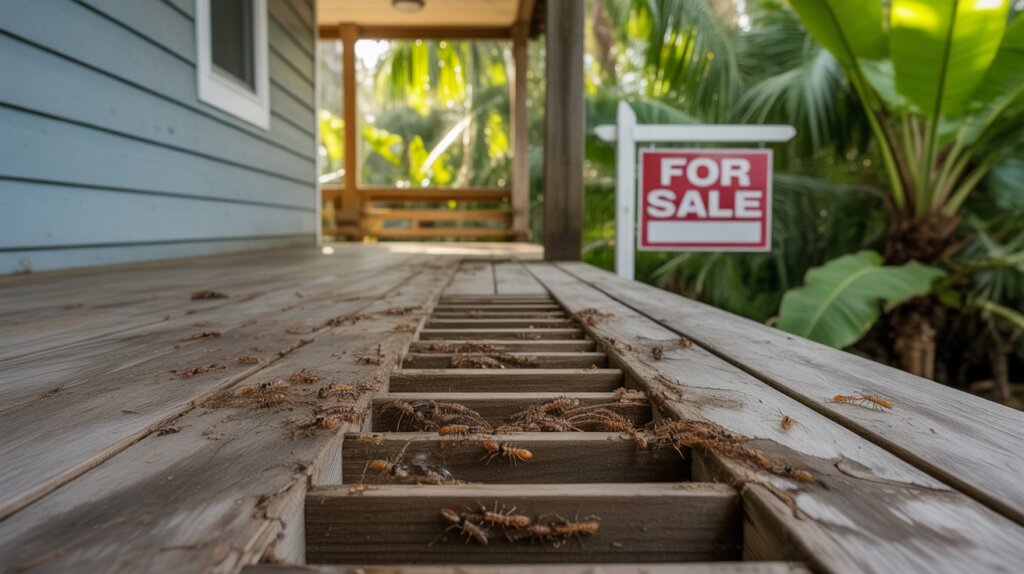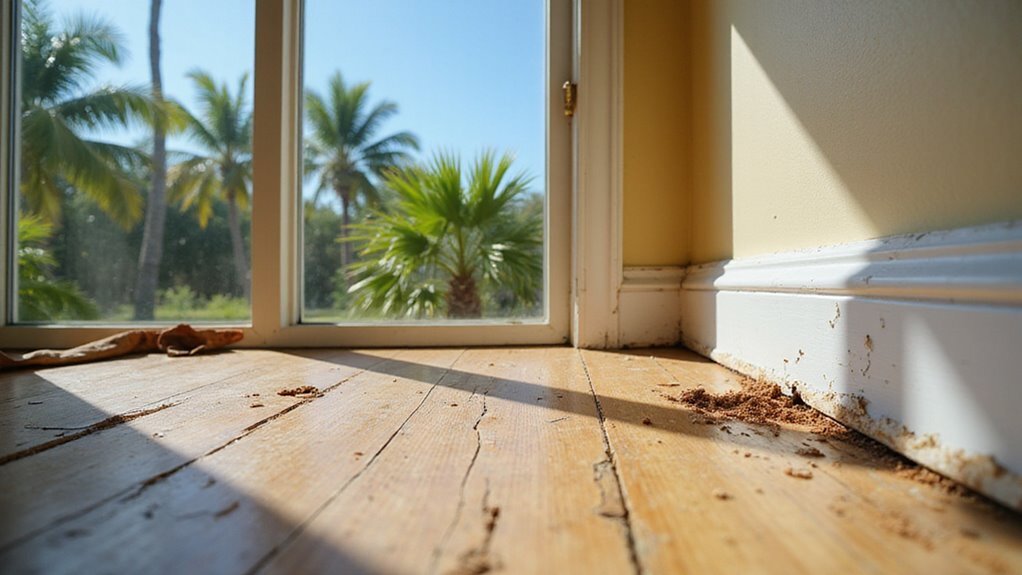Selling a house in Florida with termite damage can be stressful. Many buyers worry about unseen costs and hidden issues. Sellers often do not realize how termite history impacts the sale.
This problem can get worse if sellers ignore Florida’s strict disclosure laws. Buyers and lenders may back out if they sense risks. Termite damage, even if treated, must be shared with every potential buyer.
You can sell a house with termite damage in Florida by disclosing the problem, getting inspections, and providing documentation.
Follow proper steps to protect yourself and reassure buyers. Honest communication is the key. This blog will guide you step by step to sell your Florida home with termite damage.
Key Takeaways
- Disclose all known termite damage, treatments, and repairs as required by Florida law to avoid legal issues and build buyer trust.
- Obtain a licensed pest inspection and document all damaged areas and repairs with photos and professional reports.
- Decide whether to repair damage before selling or sell as-is, weighing potential repair costs against possible sale price and buyer interest.
- Provide buyers with inspection reports, warranties, and repair receipts to facilitate negotiations and lender approval.
- Work with a real estate agent experienced in selling homes with termite damage to ensure legal compliance and effective marketing.
Understanding Termite Damage in Florida Homes

Florida homes are at high risk for termite damage. The state’s warm and humid weather helps termites grow fast. These pests often damage homes before owners notice a problem. All-cash offers from local companies can help homeowners sell quickly if termite damage has become severe. Subterranean and drywood termites are common in Florida. They can enter through tiny cracks in wood or concrete.
Their colonies expand quickly and cause hidden harm. Untreated termite damage lowers a home’s value. It can also make selling a house harder. Florida law requires sellers to share known termite problems. If you schedule regular inspections, you can catch termites early. Moisture control also helps prevent infestations. Properly managing home maintenance can significantly reduce the risk of termite damage. These steps protect your home and keep you within legal rules.
Identifying Signs of Termite Activity
You can spot termites by looking for clear warning signs around your home. Early detection helps protect your home’s value and meets Florida’s disclosure laws. If you catch problems early, you can choose between simple fixes or calling a professional.
Mud tubes are thin tunnels termites build on walls or foundations. Wood that sounds hollow when tapped could mean termites have eaten inside. Discarded wings near windows or doors show that termites have been swarming. Accurate inspection is essential to identify the full extent of damage and prevent further issues.
Termite droppings look like small, hard pellets near wood surfaces. If you see any of these signs, act quickly to limit damage. Early action gives you more control before selling your home. Proper inspection can identify hidden infestations that may not be immediately visible.
Assessing the Extent of the Damage

You’ll need a licensed professional to inspect your property and provide a detailed report on the termite damage. This inspection will clarify whether the damage is cosmetic or if it’s compromised the structural integrity, which buyers and lenders in Florida take seriously.
Accurate assessment protects you legally and positions your home more effectively in the market. Additionally, identifying specific types of termites present can influence treatment options and costs. Understanding the market value of your home helps determine if repairs are cost-effective relative to the potential increase in sale price.
Professional Termite Inspection
A professional termite inspection checks your home for termites and damage before you list it for sale. Inspectors find out how bad the infestation is and note any structural issues. Florida law says you must tell buyers about any termite problems you know about.
The inspector starts with a careful look at all visible areas. Special tools like moisture meters or infrared cameras may help find termites you can’t see. This step ensures a thorough check for any hidden damage.
You will get a written report after the inspection. The report will list the findings and give clear recommendations. If termites are found, the inspector will suggest treatment options for you to consider.
Identifying Structural Impact
Termite damage can weaken important parts of your home. Look for signs like uneven floors, doors that stick, or cracks in walls. These can mean the foundation or main supports are affected.
Florida law requires you to share any known structural problems. Buyers may lose trust if you hide damage. If you find issues near the foundation, call a licensed contractor for advice.
You can add termite-resistant landscaping as an extra step. This shows buyers you are solving the problem. Recording all damage and repairs helps you stay honest and ready for questions during the sale.
Florida Disclosure Laws Regarding Termite Issues
Florida law requires you to tell buyers about any termite problems in your home. Sellers must share if there has been damage, treatment, or active infestations. You cannot hide these issues or hope buyers will not notice. Providing documentation such as title insurance or repair records can help clarify the property’s condition. If you know about termites, you must say so before selling.
Sellers should also give buyers any reports or warranties they have about termites. If you do not share this information, you could face legal trouble later. Sellers must answer all buyer questions about termites honestly. The official property form must include these details.
Disclosing termite history is essential for compliance with Florida disclosure laws, which aim to protect buyers from undisclosed property issues. Buyers need this information to decide if they want to buy the home.
Hiring a Licensed Termite Inspector

Hiring a licensed termite inspector gives you clear information about termite damage in your home. Florida law requires termite disclosure when selling a property. If you want to sell faster and avoid legal issues, get an inspection early.
Performing a market scan to determine the true extent of damage and repair costs can help you make informed decisions about selling your home as-is or making necessary repairs. A licensed inspector checks for termite damage and risks. Their report builds buyer trust and helps you stand out in the market.
If you schedule the inspection before listing, you will be ready with the needed documents. Pick an inspector with proper licensing and good reviews. If you request a full inspection report, you will have proof for buyers and legal records. Ask the inspector for tips on preventing future termite problems.
Below is a quick comparison of key inspection steps to help you prepare:
| Step | Why It Matters | Pro Tip |
|---|---|---|
| Inspector Selection | Ensures expertise | Verify licensing and reviews |
| Inspection Scheduling | Avoids sales delays | Book early in the selling process |
| Full Assessment | Documents all damage | Request a detailed report |
| Legal Compliance | Meets disclosure laws | Keep records for your files |
| Pest Prevention | Reassures potential buyers | Ask about prevention strategies to avoid future damage |
Getting Repair Estimates for Termite Damage
Once you know the extent of the termite damage, you’ll need to assess how severe it is before seeking repair estimates. It’s smart to compare quotes from licensed contractors familiar with Florida’s building codes and disclosure laws. This approach helps you budget accurately and protects you from liability during the sale process.
Additionally, understanding roof damage assessment can be beneficial if the termite activity has extended to other structural components of the property. Being aware of legal considerations related to property disclosure can further safeguard you during the sale while ensuring compliance with Florida laws.
Assessing Damage Severity
You need to know how much termite damage your Florida home has before selling. Buyers will check for problems, so document every damaged area. If you skip this step, you may face legal issues.
A licensed pest inspector can find all termite damage. The inspector should give you a full report showing where and how much damage exists. If you want proof, take photos for your records.
Florida law requires you to disclose pest and mold problems. You should review state rules to make sure you follow them. Accurate disclosure builds buyer trust and protects you.
Comparing Contractor Quotes
You need to get written quotes from licensed contractors after finding termite damage. Each quote should list labor, materials, and exact repairs. If you compare quotes, check the contractor’s experience and if they work with trusted termite control companies.
Buyers in Florida want clear information and proper building codes followed. Always look for contractors who know local laws and real estate rules. If a contractor offers a warranty for repairs and pest treatments, this can help your home sell faster.
Ask each contractor for references and proof of insurance. If a contractor cannot provide these, consider other options. This protects you during the repair process.
Deciding Whether to Repair or Sell As-Is
You should compare the benefits of repairing termite damage with selling your Florida home as-is. If you repair, your home may attract more buyers, but you will spend money upfront. If you sell as-is, you avoid repair costs, but may only get offers from investors.
Florida law says you must tell buyers about any termite damage. If you hide this, you could face legal problems. Repairs can help buyers get loans, but as-is sales often need cash buyers.
You should think about the repair cost and how much more you could make by fixing the damage. The type of buyers interested will also change depending on your choice. If you want more buyers, repairs may help, but if you want a fast sale, selling as-is could work. Additionally, understanding home value estimators can assist in making an informed decision about pricing your property after repairs or as-is.
Market conditions influence cash home buyer offers, and considering these factors can help you decide whether repairs will increase your sale price or if an as-is sale is more practical.
How Termite Damage Affects Your Home’s Value
Termite damage can lower your home’s value in Florida. Buyers worry about safety and repair costs when they see signs of termites. If the damage is severe, your home may sell for much less than similar properties.
Lenders often refuse to finance homes with visible termite problems. Appraisers will subtract the cost of repairs from your home’s value. If repairs are not made, your home may stay on the market longer.
Potential buyers may offer less or avoid your home altogether. Insurance companies might not cover homes with termite issues. Florida law also requires you to disclose any known termite damage.
If you provide proof of repairs and pest control, you may get more buyer interest. Accurate documentation can also help you meet legal requirements. Proper records make it easier to sell your home in the future. Additionally, understanding the impact of market conditions can help you strategize the sale more effectively.
Marketing Your Home With Termite History
If your home has a history of termites, you can still market it successfully. Florida law says you must share any known termite issues. Honest disclosure builds trust with buyers and can help you sell.
Buyers appreciate proof of repairs and treatments. Inspection reports and receipts show you took care of the problem. If you improved pest prevention, mention these steps in your listing.
Home staging allows you to highlight your property’s best features. An inviting, clean space helps buyers focus on the positives. Highlight areas that were repaired and now look new.
Pricing should reflect any past damage and current market trends. A fair price keeps your home competitive. If you are unsure, consult a real estate agent for guidance.
Working With Real Estate Agents Experienced in Termite Sales
You need a real estate agent who’s proven their expertise with termite-affected properties in Florida’s unique market. The right professional will help you navigate strict disclosure laws and protect your interests when negotiating repair credits. With skilled guidance, you can avoid costly mistakes and maximize your sale.
Identifying Qualified Agent Expertise
A qualified real estate agent is important when selling a house with termite damage. The agent should know how to handle homes with structural issues. If you choose the right agent, your sale will likely go more smoothly.
An experienced agent knows how to market homes with termite problems. They understand how to use landscaping and presentation to attract buyers. If you need help with buyer concerns, they can offer solutions.
A good agent will know local rules about pest damage. They should have a history of selling homes with termite issues. If you need repairs, they can connect you with reliable inspectors and contractors.
Mortgage rules can be strict for damaged homes. An expert agent understands lender requirements and possible financing problems. If financing becomes difficult, they may suggest creative solutions.
Navigating Disclosure Requirements
Florida law says you must tell buyers about any property defects you know about. This includes all termite damage. If you hide this information, you could face serious legal trouble.
A real estate agent with termite experience can help you. The agent will guide you through the disclosure process. They make sure you provide all reports and treatment records to buyers.
Proper disclosure builds trust with buyers. It also helps avoid disputes or delays during the sale. If you fully disclose, you protect yourself from future problems.
Negotiating Repair Credits
After you disclose termite damage, you often need to negotiate repair credits with buyers. Repair credits help cover the cost of fixing the damage. Real estate agents with termite sale experience are very helpful during this process.
Agents get clear repair estimates from trusted contractors if you ask for them. They can stage your home to show its best features and reduce buyer concerns. Agents also suggest a fair listing price that fits the market and reflects the termite issue.
A good agent will write clear credit agreements that follow Florida law. These agreements protect you when the sale closes. If you use an experienced agent, you can handle negotiations more confidently.
Negotiating With Buyers Over Termite Repairs
Termite repairs are often a key issue when selling a home in Florida. Sellers must tell buyers about any termite damage and repairs. Florida law requires this disclosure.
Buyers may ask for a termite inspection or suggest repairs. Some may want you to fix insulation or lower the price. If you have recent inspection reports, share them during talks.
If inventory is low, buyers might accept fewer repairs. Sellers should be ready to negotiate who pays for repairs. Clear paperwork helps build trust and speeds up the sale.
Always follow Florida’s legal rules during negotiations. If you stay informed and honest, you can handle termite repair talks more easily.
Using Termite Bonds and Warranties to Reassure Buyers
A termite bond or warranty can make buyers feel safer about purchasing a home with past termite issues. These agreements show you have treated the problem and offer protection for future issues. Buyers often feel more confident if they know they are covered.
A professional termite treatment record should be provided to the buyer. This document proves the property has been inspected and treated by experts. Buyers can trust that the issue was handled properly.
If the warranty or bond is transferable, it adds extra value. The new owner will stay protected without extra cost. Always confirm that the agreement allows for transfer.
It is important to list what the warranty covers. Coverage may include retreatment or repairs, or both. Buyers will know exactly what is protected if you outline this clearly.
All agreements must meet Florida law requirements. This step helps avoid legal problems after the sale. Always double-check the paperwork before closing.
Navigating Lender Requirements for Termite-Damaged Properties
Many lenders in Florida want a clear Wood Destroying Organism (WDO) inspection report before they approve a home loan. If a home has termite damage, lenders will often require proof of treatment. Some lenders may also need evidence of structural repairs.
Sellers should provide all repair records and inspection documents upfront. This helps build trust with buyers and meets lender requirements. If these steps are missed, the sale could be delayed or canceled.
Well-kept landscaping and clean staging can help a home look appealing. Good presentation may ease buyer concerns about past damage. Always focus on both repair and appearance to support a smooth sale.
Strategies for a Quick Sale Despite Termite Issues
Selling a home with termite issues can be fast if you use the right steps. Buyers in Florida may hesitate, but you can reassure them. Meeting lender and buyer expectations is only the beginning.
Sellers should always share inspection reports, repair receipts, and termite treatment records. Honest disclosure helps avoid legal problems and builds buyer trust. If buyers feel confident, they may move forward quickly.
Improving curb appeal can make your home more attractive despite termite history. Landscaping or painting the exterior creates a strong first impression. A well-kept home helps buyers see its full value.
Home staging can also help by showing off the good features and hiding minor flaws. Buyers are more likely to imagine living in a clean, inviting space. If the home feels welcoming, offers may come sooner.
Setting the right price is important if you want a quick sale. The price should reflect any termite-related repairs. A fair price often leads to faster negotiations and a quicker closing.
Conclusion
If you need to sell a house with termite damage in Florida, honesty and preparation are essential. If sellers disclose all damage and repair history, buyers are more likely to trust the transaction. If you address repairs or offer warranties, you can increase your home’s appeal.
If you want to avoid the stress of repairs and negotiations, we can help. We buy houses for cash in any condition, including those with termite damage. If you choose a cash sale, you can close quickly and move on without hassle.
If you are ready for a smooth and straightforward sale, contact Greg Buys Houses today. We will guide you through the process and provide a fair cash offer. Let us help you sell your home with confidence.

